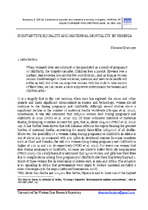| dc.contributor.author | Durojaye, Ebenezer | |
| dc.date.accessioned | 2013-09-02T11:54:25Z | |
| dc.date.available | 2013-09-02T11:54:25Z | |
| dc.date.issued | 2012 | |
| dc.identifier.citation | Durojaye, E. (2012). Substantive equality and maternal mortality in Nigeria. Journal of Legal Pluralism and Unofficial Law, 65: 103 -132 | en_US |
| dc.identifier.issn | 0732-9113 | |
| dc.identifier.uri | http://hdl.handle.net/10566/706 | |
| dc.identifier.uri | http://www.jlp.bham.ac.uk/volumes/65/durojaye-abs.htm | |
| dc.description.abstract | Introduction: It is a tragedy that in the 21st century, when man has explored the moon and other planets and made significant advancement in science and technology, women should continue to die during pregnancy and childbirth. Although recent studies show a significant decline in the number of maternal deaths worldwide (Horgan et al. 2010), nonetheless, it was still estimated that 287,000 women died during pregnancy and childbirth in 2010 (WHO et al. 2012: 22). Of these estimated numbers of maternal deaths, developing countries account for 99%, that is, about 284,000 (WHO et al. 2012: 22). It has further been shown that sub-Saharan Africa is the region bearing the greatest burden of maternal deaths, accounting for nearly three fifths (162,000) of all deaths. Moreover, the possibility of a woman dying during pregnancy or childbirth in Africa is put at about 1 in 39 compared with 1 in 3,800 in developed regions. In some countries such as Chad and Somalia, the risk of a woman dying during pregnancy and childbirth is higher at 1 in 15 and 1 in 16 respectively (WHO et al. 2012). For every one woman that dies during pregnancy or childbirth, 20 more are likely to suffer from life-long injuries (WHO 2005). On a daily basis, it is estimated that 1,000 women and girls lose their lives due to complications arising from pregnancy or childbirth. Many of these women live in developing countries such as Asia and Africa. The situation is so appalling in Africa that governments were urged to declare maternal mortality a state of emergency in the region (African Commission 2008). | en_US |
| dc.language.iso | en | en_US |
| dc.publisher | Routledge and the Commission on Legal Pluralism | |
| dc.rights | This is the author postprint version of an article published by Routledge and the Commission on Legal Pluralism. Readers may make use of the material providing due attribution is given. | |
| dc.title | Substantive equality and maternal mortality in Nigeria | en_US |
| dc.type | Article | en_US |
| dc.privacy.showsubmitter | false | |
| dc.status.ispeerreviewed | true | |
| dc.description.accreditation | International Bibliography of Social Sciences | en_US |

